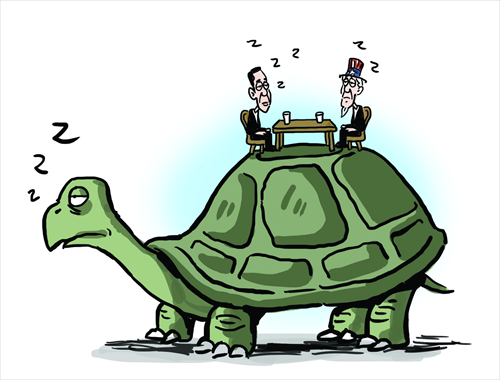 Breathtaking scenery in Redstone Park in SW China
Breathtaking scenery in Redstone Park in SW China
 Vintage cars show kicks off in London
Vintage cars show kicks off in London
 Gorgeous scenery in NE China
Gorgeous scenery in NE China
 Picturesque Barkol grassland in Xinjiang
Picturesque Barkol grassland in Xinjiang
 Small Wild Goose Pagoda - A World Cultural Heritage Site along the Silk Road
Small Wild Goose Pagoda - A World Cultural Heritage Site along the Silk Road
 Maritime Silk Road Luxuries of the Han Dynasty
Maritime Silk Road Luxuries of the Han Dynasty
 Ciao! Chinese beauties!
Ciao! Chinese beauties!
 An eye feast: BFA freshmen registration
An eye feast: BFA freshmen registration
 Top 10 most lavish weddings
Top 10 most lavish weddings
 Most amazing chi-pao beauties
Most amazing chi-pao beauties
 |
| (llustration: Liu Rui/GT) |
After addressing the general debate at the 69th Session of the UN General Assembly, Chinese Foreign Minister Wang Yi is scheduled to visit the US from Tuesday to October 2. This could be regarded as a return visit after US National Security Advisor Susan Rice's eye-catching visit to Beijing earlier this month.
The recent couple of months have witnessed frequent exchange visits by high-ranking government officials from China and the US. These visits serve as a prelude for US President Barack Obama's forthcoming tour to Beijing on the occasion of the APEC Summit in November, paving the way for the top talk between the leaders of two major global powers.
Obama's first China visit after Chinese President Xi Jinping took office, is already climbing to headlines.
Since the first Xi-Obama meeting at Sunnylands, California in 2013, informal talks seem to have become a tacit agreement between the leaders of both sides.
According to the Chinese Ministry of Foreign Affairs, the November Xi-Obama meeting will be included in a sideline visit by Obama.
Sidelined though it is, it shows an inconspicuous but significant attitude change when leaders of both nations are dealing with bilateral ties.
They are putting more attention on the content of talks instead of the form, as it has been proven since the Sunnylands meeting that more will be achieved through such casual and off-the-record talks.
More expectations are being raised around the second Xi-Obama meeting. Sunnylands witnessed China's vision to reshape Sino-US ties by establishing a new type of major power relationship to avoid the Thucydides' Trap.
This innovative and breakthrough proposal, so far, has not been responded to in a positive manner by Washington. Whether Obama will give a much clearer definition of China-US relations remains a question.
Beijing and Washington are not having a good time recently as tensions and conflicts have arisen between both sides in the South China Sea and the Ukraine crisis.
The US short-range reconnaissance has met assertive countermeasures from the Chinese military, which reminded people of the mid-air collision around Hainan Island in 2001, an accident which froze bilateral relations for a long time.
Being bogged down in Iraq and East Europe is a reason for the US to avoid going straight to define the nature of the Sino-US relationship.
Washington is weighing China's strategic calibrations when Moscow is facing stern sanctions by the West over the Ukraine crisis. The US is trying to figure out what role China seeks to play in the dangerous standoff between the US-led West and Russia.
Obama's vision for the Sino-US relationship, in his last two years as president, is to put risks with China within a controllable range. A relatively peaceful Asia-Pacific region is badly needed by Washington.
That is also why a breakthrough in the Sino-US relationship is not the top priority of Obama's diplomatic endeavor in the short term, although its relationship with China has the most significant potential to serve as a crucial factor to redefine the world order.
In fact, Obama has reasons to pull back in terms of Washington's China policy. His administration has managed to pool a great number of resources, so that the US attention has been shifted from Europe to the Asia-Pacific region, especially China's periphery.
Obama's "pivot to Asia" strategy has posed great pressure to China's rise, and this peripheral constraint against China is his biggest diplomatic legacy. It is unlikely that Obama will seek more breakthroughs.
This is the reason why dialogues between Beijing and Washington have not seen major progress in the past year. China sees the big picture as the linchpin of bilateral ties, while the US is only willing to talk about individual issues such as the South China Sea issue.
Strategic mistrust is the crux that determines China and the US won't reach an agreement over the nature of their relationship any time soon. This predicament has yet found an effective solution.
 Female bus driver drives Land Rover for commuting
Female bus driver drives Land Rover for commuting Top 3 iOS 8 features Chinese love most
Top 3 iOS 8 features Chinese love most Century-old public bath closes door in Beijing
Century-old public bath closes door in Beijing Teahouses in Chongqing: Worship to the leisure lifestyle
Teahouses in Chongqing: Worship to the leisure lifestyle Leading director Wang Quan'an detained for 'buying sex'
Leading director Wang Quan'an detained for 'buying sex' Heaven on earth: Dongjiang Lake in Hunan
Heaven on earth: Dongjiang Lake in Hunan Mixed reaction to smartphone sidewalk
Mixed reaction to smartphone sidewalk Amazing aerial photos of China's Xisha Islands
Amazing aerial photos of China's Xisha Islands Top 10 world's highest-paid models 2014
Top 10 world's highest-paid models 2014 Lingerie show at 2014 Miss China
Lingerie show at 2014 Miss China Songstress Li Xianglan dies at 94
Songstress Li Xianglan dies at 94 Police recruiting posters
Police recruiting posters Anshun Daxi- Living fossil of Chinese drama
Anshun Daxi- Living fossil of Chinese drama Urban farmers in China
Urban farmers in China 'Firepower-2014 Weibei'military exercise
'Firepower-2014 Weibei'military exerciseDay|Week|Month